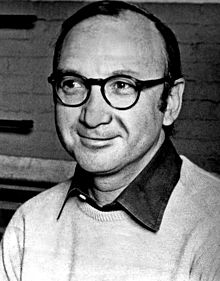By Dan Wingard

(Wikipedia photo)
LOS ANGELES — I was saddened to read of the recent death of the great Neil Simon.
I didn’t know him personally, but I felt like I did because I was lucky enough to perform in all three of the plays which form his autobiographical “BB” trilogy: Brighton Beach Memoirs, Biloxi Blues (in two separate productions) and Broadway Bound.
Brighton Beach Memoirs introduces us to Eugene Morris Jerome – a thinly disguised alter ego of the author himself – at the age of 14. I got to play Stanley, Eugene’s older brother – an equally thinly disguised alter ego of Simon’s older brother Danny.
It can easily be argued that the most important relationship in Neil’s entire life was that with his older brother. What is incontrovertible is that Neil kept exploring and re-exploring that relationship throughout his plays: Two brothers are characters in perhaps a dozen of them.
The production of Brighton Beach Memoirs in which I got to perform was special for me in many ways. For one thing, it was the first time that I (along with two of my fellow performers) was ever singled out for praise for my acting in a major newspaper’s review. I was even nominated for a local acting award for that performance. It was just the third show I ever did following college, and it served as kind of a post-graduate course in comedy. There is this one scene that is particularly unforgettable. We called it “The whack-off scene” because it was all about the younger brother, Eugene, asking his older brother about, well, you guessed it.
Performing in that scene was like surfing, but instead of surfing on water, we were surfing on laughter – wave upon wave upon wave of it. To this day, that is the single funniest scene in which I’ve ever been fortunate enough to perform.
In Biloxi Blues, we catch up with Eugene around age 19 or 20 and he’s just been drafted into the army. Stanley is not a character in this play, but Eugene meets and befriends a kind of surrogate older brother: the nebbishy but wise-beyond-his years Arnold Epstein. Arnold is one of the best – and most sympathetic – roles written in the last 40 years, and fairly early in the show he has a monologue in which he details his abuse at the hands of a couple of anti-Semitic fellow soldiers. By that point in the show, the audience is already very much on Arnold’s side, and so it’s pretty awful to hear about what he’s been put through. There were about 200 people in the audience for both productions that I did. And virtually every night I could feel 200 pairs of eyes paying rapt attention to me, as I told Arnold’s tale. You could hear a pin drop. It was a great privilege to perform that monologue – a privilege I’ll always treasure.
And finally, there was Broadway Bound“. It’s the story of Eugene, now 24, and Stanley, now 28, as they struggle, seemingly in vain, to break into show business as writers. For me, this is the greatest of all Neil’s plays, masterfully combining pathos with comedy as it explores themes of family disintegration alongside artists’ struggles to fulfill their dreams.
Neil was, arguably, the most successful Broadway playwright of all time. There was one year in the 60’s in which he had an astonishing four hit plays running concurrently.
But among certain actors Neil Simon’s work is sometimes denigrated. And while it’s true that some of his mid-level work is now dated and can feel a bit strained, his best plays are among the greatest comedies – and in some cases among the greatest plays of any type – ever written. I’ve always theorized that actors who downplay Neil Simon probably haven’t had the privilege of actually acting in one of his plays.
When performing in Biloxi Blues, for example, I always marveled at the sheer craftsmanship of the piece. Being in that play was like living inside the theatrical equivalent of the most beautiful but also impeccably-crafted piece of furniture one could imagine. And as with Moliere and Shaw, I believe his plays will continue to be performed over and over again – not just decades from now, but centuries from now.
I only got to meet Mr. Simon a handful of times, and it was always a brief encounter – for book signings and such. My favorite such encounter was the first time I met him. I had just finished the run of Broadway Bound a week earlier, and I and Paul Epstein, the actor who’d played Eugene, went to see Neil’s out-of-town-tryout of Jake’s Women at the Old Globe Theatre in San Diego. After the show, I saw Neil out on the courtyard, and we two “brothers” approached him. As Stanley would have done, I was the one who spoke for the two of us. I told Neil that we’d just finished a run of Broadway Bound playing Stanley and Eugene, and he said what I would have most wanted him to say in response, though I didn’t realize it until he actually said it. He said: “Oh. You look like a Stanley and Eugene.”
Thank you, Neil. I have lived parts of your life, even if they were only imaginary versions of it.
I’ll always treasure the experiences and will always marvel at your talent and at the sheer breadth and scope of your career. Rest in peace.
*
Wingard, an actor in Los Angeles, also is the son of San Diego Jewish World music columnist Eileen Wingard.